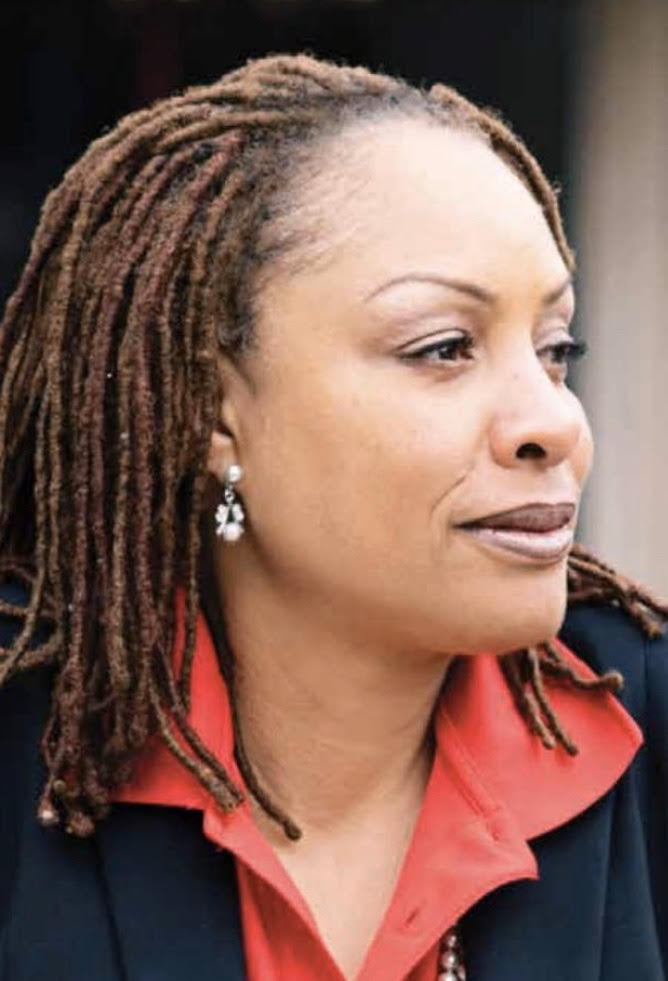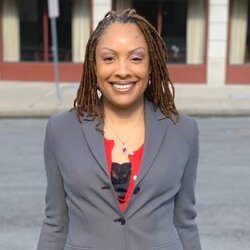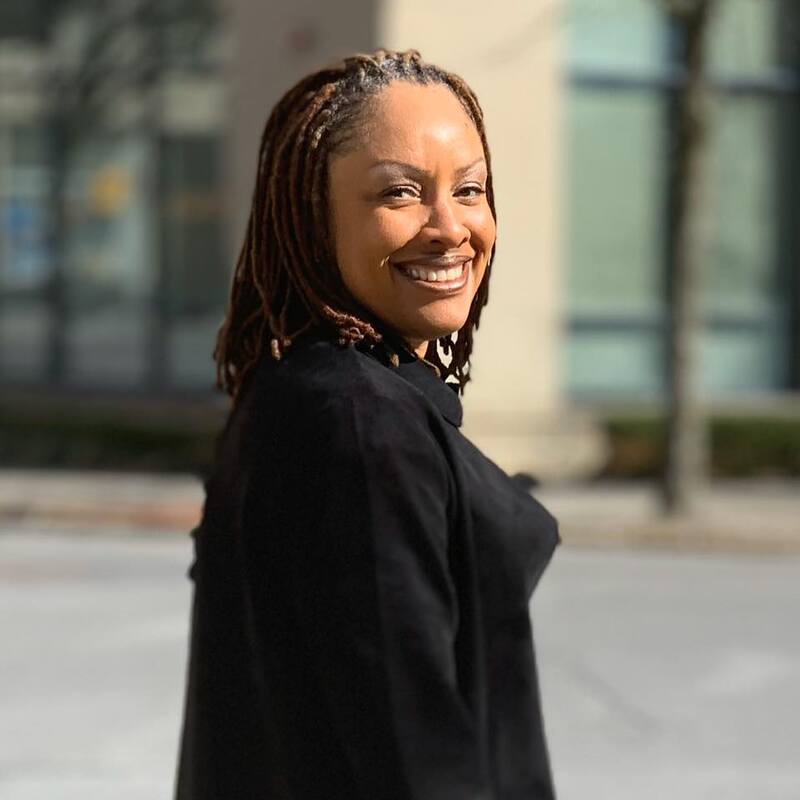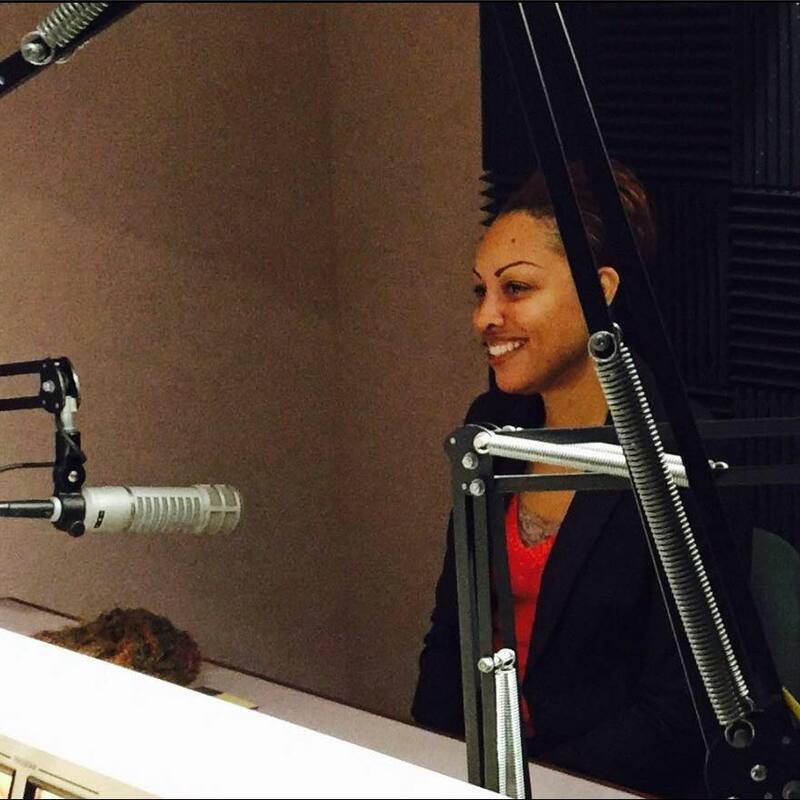A New Challenge
Dr. Shanelle R. Benson Reid @ACCESSGlobalGrp
“What if educators truly loved all children and promoted pedagogical practices that challenged the social justification of poverty, sexism, classism, exploitation, and racism?” Dr. S. R. B. Reid
 @ACCESSGlobalGrp
@ACCESSGlobalGrp
State of Education
Philosophically, I do not believe in the structure of public education. Our entire system is inadequate and antiquated. As a student, I recall thinking to myself; nothing this teacher says is encouraging me to get excited about education. I’m not interested in math, I’m not interested in science, I’m not interested in social studies and I’m not interested ELA, I guess in actuality, I wasn’t interested in school but I trusted the process so I pressed on.
In the profession, we like to believe that education has evolved. We’ve incorporated manipulative, charts, graphs, and visual representations. We allow movement, flexible seating, alternate assessments but the curriculum remains the same.
Other aspects of society have improved, however, the most important societal component has not; education has remained the same. How can we justify not revolutionizing our current educational system while our students have evolved, our society has advanced and other industries have adapted?
Impeding Academic Achievement
In most academic settings, children from diverse backgrounds and situations are less likely, when compared to middle-class and majority students, to have positive relationships with their middle-class teachers who do not represent similar backgrounds or situations. These differences reflect teachers' biases, classroom management styles, and disparities in the severity of practices used for discipline. The use of prejudicial classroom management techniques with marginalized students is a common practice. Teachers, often times, perceive the behavior of males from diverse circumstances as more aggressive and severe than the behaviors of their non-diverse counterparts. These males who misbehave in the same way as their counterparts are more likely to be punished resulting in suspensions and expulsions. The severity of these disciplinary practices with minority students impedes their achievement in the classroom, excludes them from advance courses, alienates them from the general school population, increases incidents of misbehavior, and leads to lower academic expectations and higher drop-out rates.
Socioeconomic Status
Classroom disciplinary practices are also influenced by students' socioeconomic status. Educators tend to view low-income students as having the highest potential for behavioral problems. Consequently, students from low-income homes, regardless of ethnicity, are disciplined more often than middle-class students. In addition, teachers of low socioeconomic children most often use or support the use of corporal punishment, verbal punishment, or suspension, when compared to teachers of middle-class students. Some of the behaviors by culturally diverse, lower socioeconomic status students that teachers find annoying and/or problematic are behaviors that serve as a function in the students' world outside of school.
Locked Out
Student behavior is severely scrutinized when teachers and administrators do not understand and /or represent diverse backgrounds and situations. From this perspective, marginalized students' behavior is not just different from their non-marginalized counterparts in culturally arbitrary ways; it disrupts what schools are attempting to accomplish, causing hostile dynamics in the educational environment. Subsequently, students from diverse backgrounds and situations are more inclined to misbehave when they are matched with teachers who do not represent diverse groups versus being matched with teachers who do. This stressed relationship between students and teachers leads to students eventually being locked out of education due to suspension/expulsion and prevents academic success causing a resistance to schooling and other majority-controlled institutions: which further perpetuates feelings of oppression and subjugation. In an attempt to maintain “group” identity, marginalized students develop peer groups that reject symbols and behaviors that are not in alignment with “group” think and academically successful students from diverse backgrounds and situations, are frequently at risk of being sanctioned by peers for rejecting “group” values.
Discipline and Cultural Congruence
On the other hand, many teachers from diverse backgrounds and situations can operate with ease when disciplining marginalized students. The teacher’s ability to achieve this task is possible because students and parents have culturally congruent backgrounds with the teachers. This cultural congruence helps the stakeholders relate to one another more efficiently. Identifying connections further bridges necessary gaps that foster healthy relationships and open communication between students, parents, and teachers. Parents are more willing to accept corrective language and consequences when there are similarities between the participants.
Conversely, when a teacher who does not identify with diverse circumstances is faced with the daunting task of disciplining a student from a diverse condition, underlying factors must be considered; preexisting beliefs about poverty, racially discriminatory practices, disconnection, and lack of trust to name a few. The problem with educating students of color in America is precisely that, a problem because our school system is a microcosm of our society.
Therefore, disenfranchised students suffer in schools because staff, who have the power to label, categorize and define, are not always well-intention, yet these feelings of oppression are mitigated when disenfranchised parents work with teachers from diverse backgrounds and situations.
The Transformation
Research clearly states adequate representation in the teaching profession improves educational outcomes for all students. However, the focus must not center entirely on diversifying K – 12 classrooms, but it is also necessary to investigate the needs of marginalized students, and how these needs are met continuously. In short, much can be gained from adopting a teaching philosophy that prioritizes student wellness and success over standardized testing and district distinction.
Trusting Relationships
Educating students from marginalized circumstances is a complex process involving big-picture considerations and specific instructional strategies; at the very least, these students need to know adults in their lives are aware of the cultural and social situations they encounter consistently and truly care about their personal and academic success. From this foundation, trusting relationships develop and serve as an essential context for learning. While this bridge from awareness and caring to learning and achievement is necessary for a successful school career, it is vitally important for students from disenfranchised backgrounds, who tend to experience more challenges in their personal and academic lives. Students from these backgrounds and communities benefit from the type of support that nurtures emotional growth while simultaneously providing optimal conditions for effective learning.
Equity In Instruction
Achieving equity in education requires a shift in educational philosophy and practices. This transformation involves understanding each student’s individual needs and designing educational experiences that address those needs. Furthermore, attaining educational equity requires making sure every student has the support he/she lacks. In addition, this advancement entails putting systems in place to ensure that every child has an equal chance for success.
However, ensuring every child has an equal chance for success involves understanding the unique challenges and barriers faced by individual students and providing additional supports to help them overcome those barriers. While equity may not ensure equal outcomes, the goal is to strive for equal opportunity.
Philosophically, I do not believe in the structure of public education. Our entire system is inadequate and antiquated. As a student, I recall thinking to myself; nothing this teacher says is encouraging me to get excited about education. I’m not interested in math, I’m not interested in science, I’m not interested in social studies and I’m not interested ELA, I guess in actuality, I wasn’t interested in school but I trusted the process so I pressed on.
In the profession, we like to believe that education has evolved. We’ve incorporated manipulative, charts, graphs, and visual representations. We allow movement, flexible seating, alternate assessments but the curriculum remains the same.
Other aspects of society have improved, however, the most important societal component has not; education has remained the same. How can we justify not revolutionizing our current educational system while our students have evolved, our society has advanced and other industries have adapted?
Impeding Academic Achievement
In most academic settings, children from diverse backgrounds and situations are less likely, when compared to middle-class and majority students, to have positive relationships with their middle-class teachers who do not represent similar backgrounds or situations. These differences reflect teachers' biases, classroom management styles, and disparities in the severity of practices used for discipline. The use of prejudicial classroom management techniques with marginalized students is a common practice. Teachers, often times, perceive the behavior of males from diverse circumstances as more aggressive and severe than the behaviors of their non-diverse counterparts. These males who misbehave in the same way as their counterparts are more likely to be punished resulting in suspensions and expulsions. The severity of these disciplinary practices with minority students impedes their achievement in the classroom, excludes them from advance courses, alienates them from the general school population, increases incidents of misbehavior, and leads to lower academic expectations and higher drop-out rates.
Socioeconomic Status
Classroom disciplinary practices are also influenced by students' socioeconomic status. Educators tend to view low-income students as having the highest potential for behavioral problems. Consequently, students from low-income homes, regardless of ethnicity, are disciplined more often than middle-class students. In addition, teachers of low socioeconomic children most often use or support the use of corporal punishment, verbal punishment, or suspension, when compared to teachers of middle-class students. Some of the behaviors by culturally diverse, lower socioeconomic status students that teachers find annoying and/or problematic are behaviors that serve as a function in the students' world outside of school.
Locked Out
Student behavior is severely scrutinized when teachers and administrators do not understand and /or represent diverse backgrounds and situations. From this perspective, marginalized students' behavior is not just different from their non-marginalized counterparts in culturally arbitrary ways; it disrupts what schools are attempting to accomplish, causing hostile dynamics in the educational environment. Subsequently, students from diverse backgrounds and situations are more inclined to misbehave when they are matched with teachers who do not represent diverse groups versus being matched with teachers who do. This stressed relationship between students and teachers leads to students eventually being locked out of education due to suspension/expulsion and prevents academic success causing a resistance to schooling and other majority-controlled institutions: which further perpetuates feelings of oppression and subjugation. In an attempt to maintain “group” identity, marginalized students develop peer groups that reject symbols and behaviors that are not in alignment with “group” think and academically successful students from diverse backgrounds and situations, are frequently at risk of being sanctioned by peers for rejecting “group” values.
Discipline and Cultural Congruence
On the other hand, many teachers from diverse backgrounds and situations can operate with ease when disciplining marginalized students. The teacher’s ability to achieve this task is possible because students and parents have culturally congruent backgrounds with the teachers. This cultural congruence helps the stakeholders relate to one another more efficiently. Identifying connections further bridges necessary gaps that foster healthy relationships and open communication between students, parents, and teachers. Parents are more willing to accept corrective language and consequences when there are similarities between the participants.
Conversely, when a teacher who does not identify with diverse circumstances is faced with the daunting task of disciplining a student from a diverse condition, underlying factors must be considered; preexisting beliefs about poverty, racially discriminatory practices, disconnection, and lack of trust to name a few. The problem with educating students of color in America is precisely that, a problem because our school system is a microcosm of our society.
Therefore, disenfranchised students suffer in schools because staff, who have the power to label, categorize and define, are not always well-intention, yet these feelings of oppression are mitigated when disenfranchised parents work with teachers from diverse backgrounds and situations.
The Transformation
Research clearly states adequate representation in the teaching profession improves educational outcomes for all students. However, the focus must not center entirely on diversifying K – 12 classrooms, but it is also necessary to investigate the needs of marginalized students, and how these needs are met continuously. In short, much can be gained from adopting a teaching philosophy that prioritizes student wellness and success over standardized testing and district distinction.
Trusting Relationships
Educating students from marginalized circumstances is a complex process involving big-picture considerations and specific instructional strategies; at the very least, these students need to know adults in their lives are aware of the cultural and social situations they encounter consistently and truly care about their personal and academic success. From this foundation, trusting relationships develop and serve as an essential context for learning. While this bridge from awareness and caring to learning and achievement is necessary for a successful school career, it is vitally important for students from disenfranchised backgrounds, who tend to experience more challenges in their personal and academic lives. Students from these backgrounds and communities benefit from the type of support that nurtures emotional growth while simultaneously providing optimal conditions for effective learning.
Equity In Instruction
Achieving equity in education requires a shift in educational philosophy and practices. This transformation involves understanding each student’s individual needs and designing educational experiences that address those needs. Furthermore, attaining educational equity requires making sure every student has the support he/she lacks. In addition, this advancement entails putting systems in place to ensure that every child has an equal chance for success.
However, ensuring every child has an equal chance for success involves understanding the unique challenges and barriers faced by individual students and providing additional supports to help them overcome those barriers. While equity may not ensure equal outcomes, the goal is to strive for equal opportunity.
Dr. Shanelle R. Benson Reid, President / CEO of ACCESS Global Group, LLC.
|
Meet Dr. Shanelle R. Benson Reid
Dr. Shanelle R. Benson Reid, President and CEO of ACCESS Global Group and ACCESS Global Enterprises is a Consultant, Coach, Author and Professional Speaker. Her expertise is in areas of Education, Entrepreneurship, Leadership, Cultural Competency, Social Awareness, Equity and Community / Individual Empowerment.
Dr. Benson Reid created ACCESS Global Group to operate as the parent company of ACCESS Coaching and Consulting. ACCESS Coaching and Consulting is a consulting group that focuses on cultural competency, social awareness and equity in education and employment. With assistance from her husband, Mr. Todd R. Reid, she established ACCESS Global Enterprises to serve as the parent company of ACCESS Dental Laboratories. ACCESS Dental Laboratories is a full-service dental laboratory that specializes in the design of crowns, bridges, partials, dentures, night guards, implants and veneers. |
President / CEO of ACCESS Global Group, LLC.
Dr. Benson Reid earned a Bachelor of Arts in Sociology from California State University, San Bernardino (CSUSB) and a Master of Arts in Education from CSUSB as well. Dr. Benson Reid earned her Doctorate in Organizational Leadership from the University of La Verne.
Her personal motto is "inspire individuals to pursue self-discovery, empower them to be innovative, progressive and revolutionary in thought and motivate them to be global activists.” Dr. Benson Reid’s work is changing the landscape of society by empowering individuals, families and organizations. Here at the ACCESS Global Family of Companies, “we encourage self-assessment and self-discovery while promoting innovative and progressive designs for change and implementing strategies for sustained success. Gain ACCESS! |



